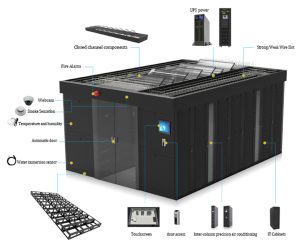In recent years, data centers have become an integral part of the modern digital infrastructure. However, traditional data centers can be expensive, time-consuming to build, and difficult to scale. That’s where modular data centers come in.

What Are Modular Data Centers?
Modular data centers are pre-built, self-contained data center solutions that can be easily transported, installed, and maintained. They are designed to be flexible, scalable, and energy-efficient, and can be customized to meet the specific needs of a particular organization. They are essentially a fully operational data center housed in a single shipping container or prefabricated module.
Modular data centers are typically categorized into two types: containerized data centers and module-based data centers. Containerized data centers are designed to be temporary solutions that can be quickly deployed to meet changing business needs. They are built within a standard shipping container and can be easily transported by truck, rail, or ship. Module-based data centers, on the other hand, are designed to be permanent solutions and are constructed from a series of modular components that can be assembled on-site. These modules are pre-manufactured and pre-tested in a factory before being transported to the deployment site.
How Do Modular Data Centers Work?
Modular data centers work by integrating all the essential components of a traditional data center into a self-contained, portable unit. This includes the servers, storage, networking equipment, cooling systems, and power supply. The pre-assembled modules are then shipped to the deployment site, where they can be quickly installed and connected to the organization’s network.
One of the key benefits of modular data centers is their flexibility. Organizations can customize the modular data center solution to fit their specific needs, whether it’s a containerized data center that’s used for temporary storage, disaster recovery, or edge computing, or a module-based data center that’s built to house larger server rooms or data centers. This flexibility is especially important for organizations that need to expand their data center capacity quickly, without incurring the significant costs and time required to build a traditional data center.
Another advantage of modular data centers is their energy efficiency. Modular data centers are designed to operate at higher temperatures, which reduces the need for traditional air conditioning systems. Additionally, modular data centers often utilize advanced cooling technologies such as free cooling and evaporative cooling, which further reduce energy consumption.
Finally, modular data centers are also designed to be highly secure. They can be outfitted with advanced security systems such as biometric authentication, video surveillance, and intrusion detection systems. The modular design of the data center also makes it easier to implement fire suppression systems and other safety measures.
Why Are Modular Data Centers Becoming More Popular?
Modular data centers are becoming more popular for several reasons. First, they offer a scalable, flexible, and cost-effective solution to data center needs. Businesses can easily add or remove modules as their needs change, without incurring the significant costs associated with building a traditional data center. This is especially important for smaller businesses that may not have the resources to build their own data centers.
Second, modular data centers offer a way for businesses to quickly deploy a data center solution in remote or temporary locations. This can be especially important for businesses that need to quickly establish a presence in new markets or respond to disaster recovery scenarios.
Third, modular data centers offer an energy-efficient solution to data center needs. The advanced cooling technologies used in modular data centers reduce energy consumption, which can help businesses reduce their energy costs and meet their sustainability goals.
Finally, modular data centers offer a high level of customization and security, which is important for businesses that need to protect their data and IT infrastructure.
